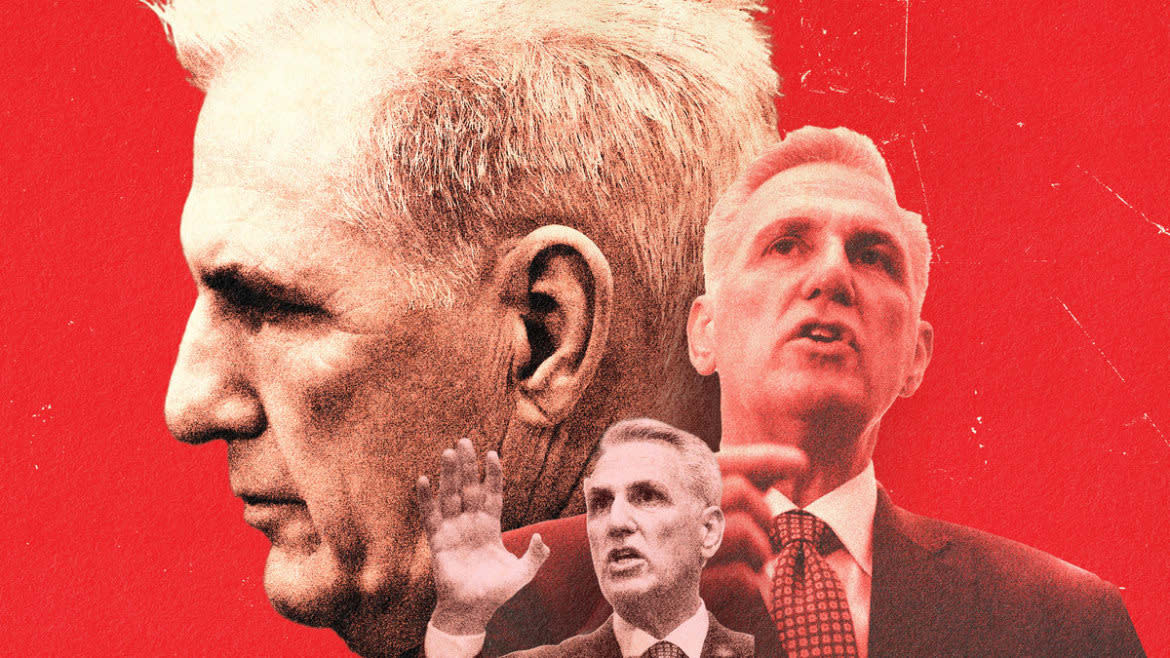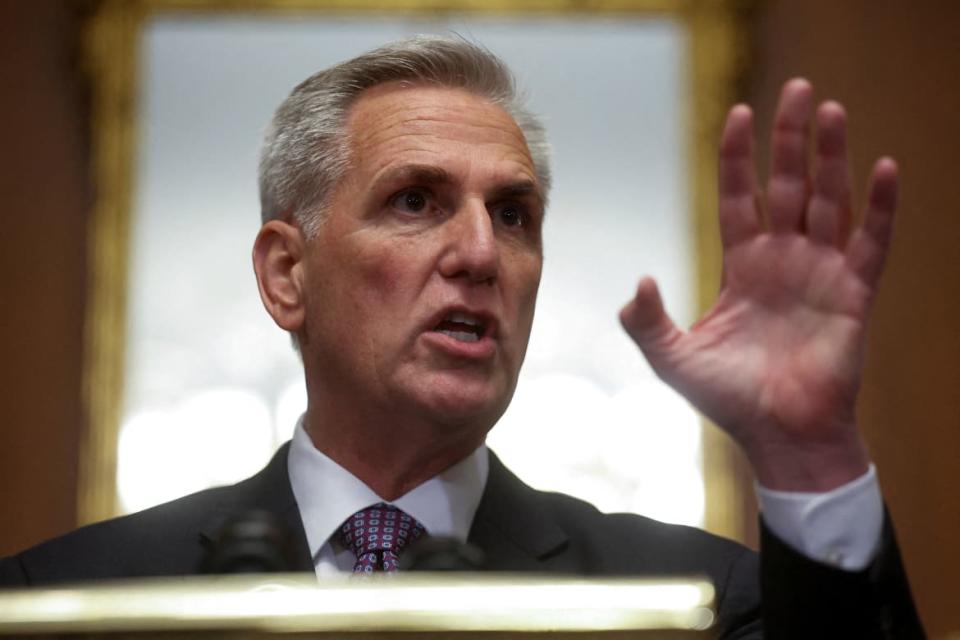Kevin McCarthy’s Temporary Success Now Sets Up His Final Failure Later

After a week-long battle where conservatives brought the House floor to a standstill, Speaker Kevin McCarthy finally struck a deal with Freedom Caucus members on Tuesday to get the House moving again.
But the temporary win for McCarthy may ultimately come at a much bigger cost—like when House Republicans are forced to fold on a spending deal in the fall. And it may be McCarthy who’s left holding the bag in the end.
For now, McCarthy is taking the resolution as a win. He struck a deal Tuesday where conservatives would stop voting against the procedural motions that bring bills to the floor in exchange for writing spending bills at budget levels from two years ago.
Republicans now plan to put forth appropriations bills at those old spending caps—save for the Pentagon budget, which will still get increases even though the United States already spends exorbitantly on defense.
Kevin McCarthy Has Lost Control of the House. Can He Get It Back?
But the irony of this new hardline stance on spending—again, with the notable exception of defense dollars—is that it may make it harder for the House to get its way in the end. And if that’s the case, it may set McCarthy up for his final act as speaker.
In the most straightforward explanation, it may be more evidence of conservatives putting their ideological purity over actual results. In the most Machiavellian account, McCarthy’s failure—and his potential removal—may actually be the true intent.
Brendan Buck, a GOP strategist who was formerly a top staffer for Speaker Paul Ryan and Speaker John Boehner, suggested that this deal may backfire on all parties involved. “You don't have to have years and years of experience to look down the road and see how this ends,” Buck told The Daily Beast.
Buck said an omnibus—an all-encompassing spending deal in which Congress wraps all the appropriations bills into one take-it-or-leave-it measure—was now the most likely scenario. A government shutdown, he said, “feels very possible,” too. And while Buck gets that Republican leadership can argue they’re not breaking the deal with Democrats, he said it was hard not to read between the lines.
“I understand the technical argument they're going to make, that it’s setting a ceiling, not a floor or level. That may theoretically be true,” Buck said. “But I think everybody involved understands that this was setting spending levels.”
He continued that the whole concept of the deal with President Joe Biden—where Republicans and Democrats agreed to raise the debt ceiling in exchange for writing appropriations bills at those newly agreed-upon levels—was a core element allowing everyone in Congress to “jump past the budget resolution process and actually know how much we're spending.”
“That was the deal,” Buck said.
Typically, in the wonky explanation of Congress, the House and Senate are supposed to adopt a budget resolution that sets topline spending numbers, and then appropriators write spending bills to those agreed-upon levels.
But in this Freedom Caucus-designed version, Republicans go back on the deal with Biden, act like the spending levels they set in the debt limit deal were just limits that Congress couldn’t exceed but also didn’t have to meet, and then magically get those spending bills passed by the Democratic Senate and signed by the Democratic president.

If those expectations seem unrealistic, it’s because they are.
But that’s exactly what Freedom Caucus members are insisting upon—and it’s exactly what McCarthy has agreed to do. At least for now.
Allies of GOP leadership allies weren’t inclined to predict how this gambit would end. And conservatives certainly aren’t spelling out how their plan is going to ultimately work—or who would pay the price for it not working. But nobody is denying that these new expectations are bound to complicate things.
Rep. Tim Burchett (R-TN), one of the conservative defectors who was holding up proceedings, said he doesn’t think this new deal with McCarthy will lead to an omnibus. “We’ve gotta get realistic about where we are and what we can do,” he said.
Burchett went on to describe the “art of compromise,” which he said is asking for a certain amount, saying what you got back isn’t everything you wanted, “and then you walk away snickering, because it’s everything you wanted.”
Predictably, Burchett isn’t sure what the Senate will do, or whether they’ll get behind lowering the caps. (They almost certainly won’t.) But Republicans like Burchett would very much like to believe they just reined in government spending, even though the most likely scenario is that the Senate just wins the spending standoff now.
Still, Republicans are moving ahead at the moment with the assumption that their bankshot maneuver will actually work.
Rep. Blake Moore (R-UT), a moderate, said he was “always going to be concerned” about the prospects of passing the appropriations bills, expecting “Democrats to just oppose it—just based on the topline number, not the actual content of the bill.”
But he’s good with the current approach and the efforts to cut wasteful spending, even if it tees up a clash with the Senate.
Short of blowing up the filibuster, any spending deal in the Senate will require 60 votes, meaning at least nine Republicans would have to join all 51 Democrats in support. And Biden would still have to sign the legislation—an unlikely prospect if House Republicans went back on their deal claiming they technically were being true to the debt limit agreement.
And yet, House conservatives seem to be brushing off the challenge, believing it’s all just another opportunity to own the libs.
“What we should be doing in the House,” Rep. Byron Donalds (R-FL) said, “is driving as hard a bargain as we possibly can, because this town has spent too much money over too many years and they’ve become addicted to it.”
Donalds, a Freedom Caucus member and staunch supporter of Donald Trump, said he thought going below the spending caps set in the debt limit deal was a wise approach.
Asked about the likelihood of passing an omnibus, McCarthy told reporters Monday that he has a longstanding position against putting an omnibus on the floor as speaker.
Asked whether this new deal tees up a government shutdown, McCarthy completely dodged the question, instead saying that he prays for reporters, who he believes are not positive enough.
In that less positive, more skeptical world, the House could end up passing a continuing resolution—a stopgap measure that just continues government spending at current levels for a certain period of time. But that also would go against McCarthy’s commitment to pass all 12 spending bills on time.
That would almost certainly be less of a betrayal to conservatives than an omnibus. And it may take a painful government shutdown—one in which Republicans were taking the majority of the blame—before McCarthy would put an omnibus spending deal on the floor.
Kevin McCarthy’s GOP Enemies Are Finally Getting Their Revenge
But either way, conservatives are setting McCarthy up for failure, insisting that reneging on his deal with Biden not only won’t come with consequences, but will also somehow lead to reduced government spending.
If, as it’s almost inevitable, McCarthy falls short of those lofty expectations, he could be in for trouble. And regardless of how the speaker falls short, he’ll be a weaker negotiator in the future—one who can’t keep his word.
Democrats never wanted to negotiate a debt deal with McCarthy in the first place. A number of Senate Democrats said they’d specifically be concerned about McCarthy’s ability to keep his word on a deal, given the control just a few members can exert over his speakership. Ultimately, Democrats negotiated.
But if McCarthy goes back on the deal, arguing he’s somehow living up to the letter of the agreement, he risks proving the left’s point.
“I don't know why Democrats would negotiate with McCarthy in the future if there's a potential that members are going to completely undermine whatever deal they reach,” Buck said.
As always, thanks to the deal he struck to be speaker in January, McCarthy risks a motion to remove him from the speakership.
And yet, McCarthy is sticking with his impossibly positive outlook. As he spins it, things are fine, and he’s doing his job just fine.
“My job isn't to pass a bill that I hope the Senate will take up because the Senate doesn't do their work,” he told reporters Monday. “My job is to pass a bill—just as we found in the debt ceiling—that the House believes in, that puts America in a better place.”
Get the Daily Beast's biggest scoops and scandals delivered right to your inbox. Sign up now.
Stay informed and gain unlimited access to the Daily Beast's unmatched reporting. Subscribe now.

 Yahoo News
Yahoo News 
